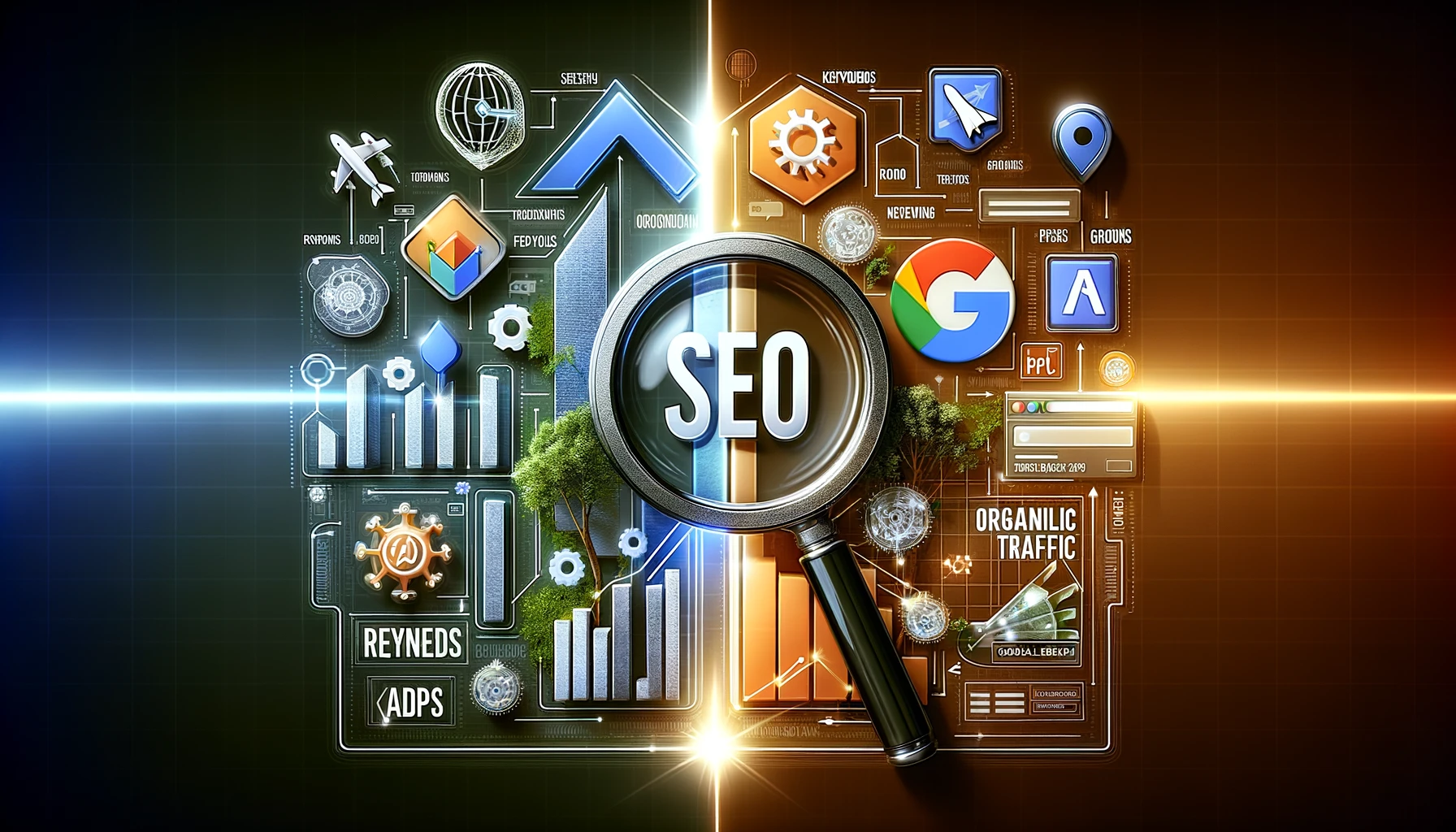In the world of digital marketing, two strategies often dominate the conversation: Search Engine Optimisation (SEO) and Google AdWords (now known as Google Ads). While commonly viewed as separate or even competing approaches, the truth is far more synergistic. Understanding the distinct roles and combined potential of SEO and Google AdWords is crucial for businesses looking to maximise their online presence and marketing efficiency.
Often, there’s a misconception that one must choose between organic search strategies (SEO) and paid advertising (Google AdWords). However, this perspective overlooks the unique strengths and interplay between the two. SEO, known for building long-term online visibility, and Google AdWords, renowned for its immediate impact and targeted reach, are not mutually exclusive but rather complementary tools in a comprehensive digital marketing toolbox.
This blog post aims to clarify the differences and synergies between SEO and Google AdWords. I’ll explore how these strategies can not only coexist but also enhance one another, creating a balanced and effective online marketing plan.
Understanding SEO and Google AdWords
What is SEO?
Search Engine Optimisation, or SEO, is a strategic process aimed at enhancing a website’s visibility in organic (non-paid) search engine results. It’s about understanding what people are searching for online, the answers they are seeking, the words they’re using, and the type of content they wish to consume. By aligning your website’s content with these insights, SEO helps improve your site’s relevance and authority, thus increasing its rank on search engine result pages (SERPs).
The key components of SEO include on-page optimisation (like keyword-rich content, meta tags, and URL structure), off-page optimisation (such as backlinking and social media engagement), and technical SEO (which covers aspects like site speed, mobile responsiveness, and structured data). The goal is to provide users with the best possible answer to their queries, which, in turn, is recognised by search engines as a marker of quality and relevance.
What is Google AdWords?
Google AdWords, is a pay-per-click (PPC) advertising platform. Unlike SEO, which focuses on organic search results, Google Ads allows businesses to create and display ads on Google’s search engine and other Google properties. When users search for specific keywords, these ads may appear above or beside the organic search results, offering immediate visibility.
The strength of Google Ads lies in its ability to target specific audiences and keywords, giving advertisers control over who sees their ads and how their ad budget is spent. Advertisers bid on keywords, and the cost per click can vary based on the competitiveness of the keyword and the quality of the ad. Google Ads operates on a pay-per-click model, meaning businesses only pay when a user clicks on their ad.
SEO vs. Google AdWords
While both SEO and Google AdWords are pivotal in driving web traffic, they differ in several ways. SEO is a long-term strategy focused on building organic search visibility over time. It requires continuous effort but provides sustainable results and credibility. On the other hand, Google AdWords offers immediate visibility and faster results, but at a cost for each click.
In essence, SEO is about ‘earning’ your way to the top of search results through quality and relevance, whereas Google AdWords is about ‘buying’ your way to the top. Both strategies have their place in a well-rounded digital marketing plan, and understanding how they complement each other is key to leveraging their full potential.
The Synergy of SEO and AdWords in Digital Marketing
While SEO and Google AdWords are distinct strategies, their combined use can create a more powerful and comprehensive digital marketing approach. The synergy between these two tactics lies in how they complement and enhance each other’s strengths.
Enhanced Visibility and Reach
AdWords provides immediate visibility at the top of search engine results, ideal for new websites or promotional campaigns. Meanwhile, SEO builds a solid foundation for long-term organic visibility. Employing both means your business is visible to users regardless of whether they click on ads or organic listings.
Keyword Strategy Reinforcement
Using AdWords gives you access to valuable keyword data, such as the most effective keywords in terms of clicks and conversions. These insights can be used to inform and refine your SEO strategy, helping to focus on the most profitable keywords for organic search.
Targeting Different Stages of the Customer Journey
SEO is excellent for targeting users in the early stages of information gathering and research, while AdWords can be more effective in reaching users ready to make a purchase. This dual approach ensures you engage potential customers at different stages of their buying journey.
Improved User Experience and Content Strategy
The content and landing pages created for AdWords campaigns can be leveraged for SEO purposes. Similarly, SEO-driven content enhancements can improve the quality score of your AdWords campaigns, potentially lowering the cost per click and increasing ad effectiveness.
Risk Mitigation and Market Adaptation
SEO is subject to algorithm updates, which can affect your site’s ranking. AdWords campaigns can be adjusted more quickly and are less impacted by these changes, providing a stable flow of traffic even when organic rankings fluctuate.
Comprehensive Market Coverage and Brand Presence
When your business appears both in paid ads and organic listings, it increases overall brand visibility and credibility, giving users multiple pathways to reach your website.
Best Practices for Combining SEO and AdWords
Effectively combining SEO and Google AdWords requires a strategic approach that maximises the strengths of each while ensuring they work harmoniously. Here are some best practices to consider:
Unified Keyword Strategy
Use the keyword performance data from your AdWords campaigns to inform your SEO efforts. Identify which keywords convert well in your paid campaigns and integrate them into your organic content strategy. Identify keywords that you rank for organically but don’t bid on in AdWords, and vice versa. This helps in covering a broader range of relevant search queries.
Consistent Messaging and Branding
Ensure that the messaging and branding across your SEO and AdWords efforts are consistent. This unified approach reinforces brand recognition and trust among your target audience.
Optimise Landing Pages
Design landing pages that are optimised for both paid and organic traffic. This includes relevant content, strong calls-to-action (CTAs), and user-friendly design elements. SEO-optimised landing pages can improve the Quality Score in AdWords, potentially lowering cost-per-click and improving ad positions.
Leverage AdWords for Immediate TestingUse AdWords to test new keywords or marketing messages quickly. The immediate data you receive can guide longer-term SEO strategies.
Diversify Approach for Different Audience Segments
Recognise that different audience segments may respond differently to organic versus paid search. Adjust your tactics based on audience behaviour and preferences.
Monitor and Analyse Combined Metrics
Regularly review both SEO and AdWords analytics. Look for trends, such as changes in click-through rates, conversion rates, and overall traffic patterns. Be prepared to make adjustments based on your analysis. Digital marketing is dynamic, and a flexible approach will allow you to stay ahead of changes.
Continuous Learning and Adaptation
Keep up-to-date with the latest trends and updates in both SEO and Google AdWords. The digital landscape is always evolving, and staying informed is key to success.
By following these best practices, you can create a robust digital marketing strategy that leverages the strengths of both SEO and Google AdWords. This integrated approach not only increases your visibility across different channels but also enhances the overall effectiveness of your marketing efforts.
Conclusion
In conclusion, integrating SEO and Google AdWords allows you to maximise your digital marketing efforts. It’s not about choosing one over the other but rather understanding how they can work together to achieve your business goals. This synergistic approach can lead to increased traffic, better conversion rates, and a stronger online presence.









